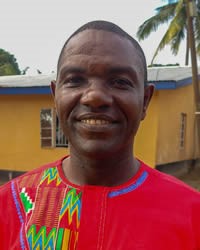Loko, Landogo in Sierra Leone

Photo Source:
Copyrighted © 2026
Kerry Olson All rights reserved. Used with permission |
Send Joshua Project a map of this people group.
|
| People Name: | Loko, Landogo |
| Country: | Sierra Leone |
| 10/40 Window: | No |
| Population: | 232,000 |
| World Population: | 232,000 |
| Primary Language: | Loko |
| Primary Religion: | Ethnic Religions |
| Christian Adherents: | 5.00 % |
| Evangelicals: | 0.90 % |
| Scripture: | New Testament |
| Ministry Resources: | Yes |
| Jesus Film: | Yes |
| Audio Recordings: | Yes |
| People Cluster: | Mande |
| Affinity Bloc: | Sub-Saharan Peoples |
| Progress Level: |
|
Introduction / History
The Loko were among the slaves shipped to America while slavery still existed. Today, they are close neighbors of the Bande tribe. They speak a Niger-Congo language that is also called Loko. The Loko occupy a large section of Sierra Leone and a small area in Guinea below the Fouta Djallon region.
What Are Their Lives Like?
The Loko live on a land of gently rolling coastal plains broken by rocky spurs of the Fouta Djallon highlands. Loko villages are grouped together at the bases of hills, in the open plains, or on the valley floors. Usually, a small group of compact huts makes up a village. These huts are round, with wooden walls and cone-shaped, thatched roofs. In this tropical region, the average temperature is about 82º F. , with 65 to 95 inches of rain falls annually. Baboons, hyenas, and antelope are common in the area, as are snakes and crocodiles.
Like most of the tribes in West Africa, the Loko are primarily farmers. Rice, the staple crop, is grown both in the swamps and on the hillsides. Other important crops include manioc, corn, potatoes, peppers, and bananas. In addition, house gardens supply other vegetables, fruits, and nuts for each family.
Oil palms flourish in this region of Sierra Leone. The trunks, branches, palms, nuts, and sap of these trees are all used and highly treasured. Soap, wax, wine, oil, and baskets are just some of the items produced from the palms.
The Loko are engaged in several crafts, such as basketry, cabinet making, and net making. In addition, they participate in many important ritual festivities and ceremonies throughout the year. Much dancing accompanies these events.
The Loko are divided into nine districts, with each being ruled by a chief. Each village in the district is ruled by a headman, who answers to the chief. The Loko are a family-oriented people, and a village is generally made up of a family lineage. The Loko are also said to be open-minded, cooperative, and open to outside influences.
Loko society is basically patrilineal, which means that they trace their lineage through the males. Polygyny (having more than one wife) is practiced by many of the men. Before a Loko man marries, he must first pay a bride-price to the girl's parents.
What Are Their Beliefs?
A small segment of the population is Christian, but most of the Loko are ethnic religionists. Many believe in witches who can be either male or female. These witches are believed to derive pleasure from causing accidents and spreading sickness among the tribe. As a result, many Loko fear witches and carry charms or medicines with them to ward off their evil acts.
What Are Their Needs?
There are serious efforts to reach the Loko people for Christ. The New Testament is available in their language. Leadership development and discipleship materials for new believers are essential in order to continue the growth of the Church among the Loko.
Prayer Points
Pray for the Lord to bless the Loko people physically and spiritually in such a way they will be drawn to Christ.
Pray for the Loko people, especially their headmen and chiefs, to have a hunger for the truth and righteousness that only Jesus Christ can provide.
Pray for efforts to take Christ to the Loko people will result in a Disciple Making Movement.